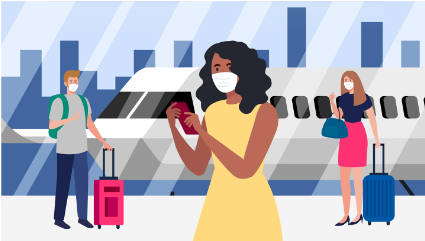When you send your staff on business trips, you trust them to represent your business well and do their job. At the same time, they expect all the company’s policies they follow are designed to keep them safe.
This isn’t just an expectation on their part; it’s your duty of care. As a travel manager, you have a legal and moral obligation to ensure everyone arrives safely and returns from a corporate trip.
In some ways, this depends as much on them as on you. They must follow the basic standard safety behaviors and exhibit common sense. Their actions are out of your hands, but there are some things you can do to keep them from outside dangers.
Add these five tips to your corporate travel policy, and your employees will be safer while they’re on the road.
1. Know Where You’re Sending Your Team
The destination for your staff’s trip may seem harmless, but go ahead and research the current climate there, just in case. There is a lot of turmoil in the world, and you don’t want to send your people directly into harm’s way if it’s avoidable.
For example, data collected over the past few years shows many riots in the United States. Many of these were peaceful and resolved without conflict.
However, if your research shows any sign of tension, consider rescheduling or redirecting the trip. This is particularly vital if the work is taking your employees overseas or out of the country where they can’t return home easily.
2. Share the Emergency Plan
Your corporate travel policy has an emergency plan in place. The time for learning what it says isn’t during the emergency, though.
Before your staff heads out on their trip, take a minute to ensure they know what to do and who to contact if there’s a serious problem. Have them save the phone number and email address for emergency contacts on their devices. They may be annoyed at the inconvenience, but it will be to their advantage if something does occur.
3. Check the Health Requirements
Since COVID, many businesses have health requirements. What are you sending your staff to, and will they need vaccines? Health checks? Negative COVID tests?
It’s your job to know the mandatory requirements and pass them on to the staff. If a negative COVID test is part of the rules, the company should pay this fee or reimburse the employees.
Your workers need to feel safe wherever they’re headed. You can help ensure this happens by preparing them for what they’ll run into when they get to their destination.
4. Give Them a Checklist of Essential Documents
You can assume everyone knows what to bring on their trip, or you can show you did your duty of care and provide a list of these essential documents for them.
If the travel is within your country, it’s a simple list. Each person should bring their government-issued ID and, if applicable, a passport. They’ll need their health insurance cards, any medical IDs they have, and their per diem and money.
Your business may use name tags, and you can request that they bring and wear those during meetings.
International travel gets more complicated. The list of crucial things to bring depends on the country they’re visiting. It’s wise to visit the appropriate government’s website and print a list of suggested documents, personal care, and prohibited items.
5. Provide an Itinerary and Map
For travelers headed to a destination for the first time, the more information you can give them, the safer and happier they’ll be.
Give them a list of everything they’ll need to know to get through their time away. Include any local or cultural customs they should be aware of, directions to the transportation options they have, and contact numbers for all lodging and meeting sites.
You might want to include a general reminder of safety tips to guard against theft and crime and what to do if they’re victims of either.
You will likely feel as though you’re a parent sending your child off to college, but that’s okay. This extra care may be what it takes to bring your workers back home safely.
Conclusion
While you consider ways to keep your workers safe while they’re on a corporate getaway, it’s smart to err on the side of “too much” protection. Their well-being and the company’s reputation depend on your travel policy and attention to your duty of care.
Follow these tips, and your staff will be able to focus on their job instead of being concerned for their safety.

